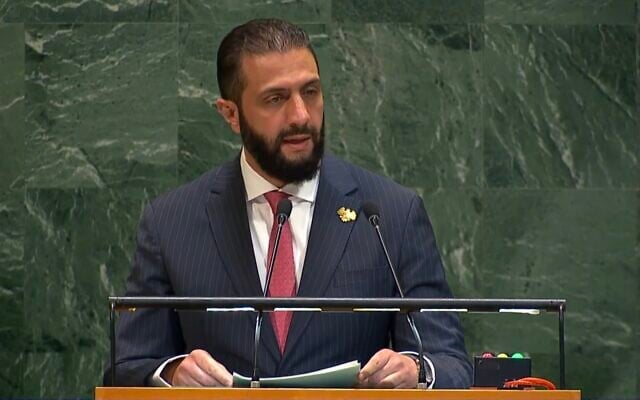From al-Qaeda to the UN: al-Sharaa's Victory Lap in New York
Beyond the campaign driven by Qatar and Turkey lie the cold interests of the West. For European leaders, the return of millions of Syrian refugees at the end of the civil war is the real prize. This is how Syrian President Ahmed al-Sharaa managed to bury the pile of skeletons in his closet.
Shachar Kleiman
Israel Hayom
Sep 24, 2025


During their public conversation at a conference, Petraeus asked al-Sharaa: "I faced immense difficulties in Iraq. How will you deal with the challenges in Syria?" The former al-Qaeda commander could not suppress a smile. "My mission in Syria is tougher than yours was in Iraq. You had the option of leaving. Our options are far more limited," he replied.

Ahmed al-Sharaa with former CIA Director David Petraeus
Even before his visit to the US, al-Sharaa appeared on CBS's "60 Minutes," moving from a defensive posture to lightly taunting the West. The ease with which he spoke was telling. From his perspective, it is the international community that failed Syria and now owes its support in reconstruction. He used the platform to list his achievements: the fight against the Islamic State, the expulsion of pro-Iranian militias, the removal of Hezbollah, and the release of Bashar Assad's political prisoners. In his telling, it is the world, not him, that must answer the hard questions.
His message resonated quickly. In New York, he was warmly received, including by French President Emmanuel Macron, long a self-styled champion of human rights. The enthusiastic welcome proves that beyond the cross-continental campaign run by Qatar and Turkey on al-Sharaa's behalf, Western interests were at play.
For European leaders, the pressing issue is the millions of Syrian refugees who could potentially return home once the civil war ends. The massacres carried out against Druze and Alawites seem to trouble them far less. Just last week in western Syria, Alawites reported an attack by Islamist groups aligned with al-Sharaa's rule.
Israel, meanwhile, has become the prime target of Arab leaders' denunciations. Not since Yasser Arafat's infamous UN appearance with a pistol on his hip, or Libyan dictator Muammar Gaddafi's bizarre lecture on "democracy," has the General Assembly seen such hypocrisy. Today's authoritarian rulers, unbound by any constraints, still stand at the podium and lecture Israel about not being a democracy.
Jordan's King Abdullah, who keeps his own half-brother under house arrest, accused Israel of waging a "campaign against al-Aqsa," echoing Hamas propaganda. The emir of Qatar, who maintains only a sham parliament in his own country, protested Israel's targeted killings of senior leaders of the terrorist group he hosts and indulges in Doha. Al-Sharaa himself joined the chorus, attacking Israel's "aggressive policies" as though he were an elected leader rather than a warlord who seized power by force.

Macron and Al-Sharaa at the UN
Yet, Israel's own confused policy cannot be ignored. On the one hand, it has opened channels of dialogue with al-Sharaa, lending him legitimacy. According to Syrian sources, negotiations between Damascus and Jerusalem center on the 1974 disengagement agreement and the scope of an Israeli withdrawal from territory captured since the collapse of the Assad regime. Another dispute involves the use of Syrian airspace. On the other hand, Israel maintains close ties with the Druze in Sweida, which could clash with any understandings reached with the Syrian government.
Al-Sharaa's rise offers a lesson: consistent policy and a focused campaign can work wonders for a leader with a closet full of skeletons.
Israel's justified war against the terrorist organizations in Gaza has been exploited by adversaries on the international stage. But Israel appeared to have abandoned this diplomatic battle before it even began.
Only now, after two years, was an Israeli "public diplomacy system" established, and even then there is no civilian Arabic-language spokesperson. Ministers compete with one another for the most inflammatory soundbite.
Under these conditions, it is no surprise that dictators with blood on their hands get to reinvent themselves as human rights lecturers.
No comments:
Post a Comment